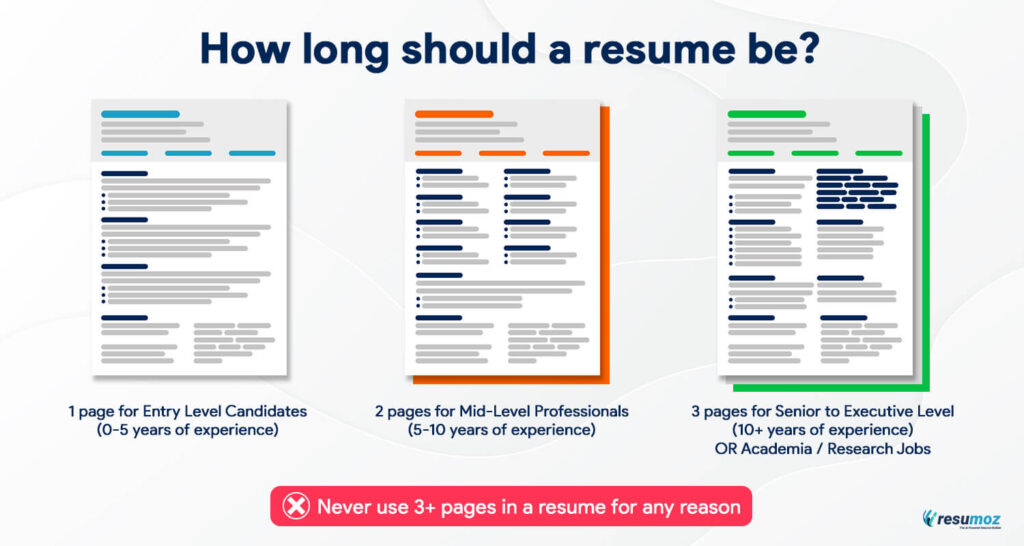Your resume is one of the most influential factors in determining your career’s future. Within a few pages of your resume, you must persuade the hiring manager that you are the best candidate for the job. However, there has been some debate about how many pages you should include in your resume to impress a hiring manager. As a result, job seekers eventually have a problem determining how long a resume should be.
The length of your resume is just a number and is determined by several factors. As a result, the length of the resume will vary depending on the job you’re applying for, the individual’s level of experience, educational qualifications, and the number of relevant skills.
Many people anticipate a quick, straightforward solution to this problem. So, if someone asks what the standard resume length is for the current job market, the simplest answer is “a resume should be no more than one page long.”
However, there may be times when your resume can be as long as two or three pages. However, for any reason, your resume should not be more than three pages long.
In this article, we will discuss how long your resume should be based on your level of experience, tips to help you shorten your resume if it is too long, and some other important information regarding resume length. However, if you are new to resume writing, we recommend that you first read our resume writing guide.

When to use a one-page resume?
Below are a few instances where you can limit the resume to a single page. If you find yourself in one of these situations, keep your resume to one page.
•
You’re writing your first ever resume
•
If you are a recent graduate
•
When you haven’t much experience
•
If the specific job or industry recommends a single-page resume
•
If you’re switching careers
•
You have less than 10 years of experience
•
You are applying for an internship
•
If you need to highlight your skills, not the experience
Why is a one-page resume best for you?
Did you know that a hiring manager can skim read a resume in as little as 6 seconds? If they aren’t impressed with you in that short amount of time, you may lose the interview. A one-page resume, on the other hand, is more than enough to condense your best set of qualifications into a single page and market you as the best candidate for a specific job.
If you want to summarize yourself and get the hiring manager to understand you quickly, a one-page resume is best for you. If you can write your resume concisely and to the point, there is no reason to include a second page.
When to use a two-page resume?
Most of the time, if you have worked for many years or several companies and have a significant level of work experience, you must extend your resume to two pages. Below are some of the situations you need to consider to write a two-page resume.
•
If you’re an experienced candidate
•
Your resume is at least one and half page long after adding all the skills, experience, and qualifications
•
You have robust technical skills and knowledge
•
If you are applying for mid-level position
•
If employers require certain other resume sections
Why is a two-page resume a good choice?
If you freeze all your career information into one page that will make the recruiter confused when reading your resume. So it’s always a good choice to move for a second page if you have an extensive career history such as more than 10 years of experience.
Even if you are a highly skilled or experienced candidate, two pages are enough to include your resume summary, work experience, educational qualifications, skills and other required information.
When should your resume be 3 / three+ pages?
Can your resume be longer than 3-pages? Definitely not. We recommend that you don’t extend your resume by more than three pages for any reason. But there are times when you may have to write a comprehensive three-page resume for a few essential occasions. The following are some examples. Except in the below two cases, we don’t recommend you to write a 3 page resume.
•
You’re applying for a C-Suite job
•
If you are applying for specific industries like academia
•
You are writing a resume for a Federal job
Why should you write a 3-page resume?
If you are applying for a top executive job like CEO, CIO, CMO, or CFO, you must be a highly experienced and qualified person. So it can often be difficult for you to pack information about your career into a single page or two. So it is better to extend the resume upto 3 pages to increase the legibility of your comprehensive resume and to make it neat.
Also, if you are applying for jobs in specific fields such as academia, you can often ask those educational institutions for details about your educational background, published work, studies, and even information about your projects. In such cases you need to allocate a lot of space in your resume to include that information.
When creating a federal resume, there is a separate format for it, so here also you can extend your resume up to 3 pages to best describe yourself as the perfect candidate for the job.
How to reduce your resume’s length?
The shorter a resume, it is easier for a recruiter to scan it, and it is no secret that a well-optimized resume, even if it is a single page, gives you more chances to get an interview.
Are you aware of how to shorten your resume if it is too long? If not, the following tips will assist you in reducing your resume to the appropriate length or to a single page.
01. Emphasize your most relevant experience
Employers always strive to recruit people with related skills and experience for vacant positions in their organization. Therefore, if you highlight only the relevant experience and leave out the irrelevant work experience, you will be more likely to get an interview opportunity or even job opportunities.
Adding only related experiences and omitting irrelevant job experiences sometimes may indicate work gaps in your resume. It’s not really a big deal. But if you think it will be a problem for you or your prospective employer, you can eloquently explain away your work gaps via a cover letter. Read our cover letter writing guide to learn how to write a cover letter correctly.
02. Focus on your most recent work experience
Entering information about each of your jobs in a resume extends it unnecessarily. So only include your recent 10-15 years of experience. Anyway, recruiters don’t care about your older experiences. They want to know what achievements you have made in the job in the recent past.
If you worked in a company 15 years ago with technologies that are not currently in use, you may have skills in them, but those skills are not valid for you to get a job in the current job market. So that’s why you need to update your resume regularly with your most recent experience.
However, if you have an educational qualification in the relevant field, it doesn’t matter when you obtained it. Insert it into the resume. Because the value of your educational qualifications never goes down.
03. Make use of effective spacing, margins, right fonts and font sizes
Don’t use large blocks of paragraphs when describing your job. Instead, you can list achievements using bullet points.
Also try to maintain a positive white space between the bullet points. Customizing margins and spacing between bullet points and resume sections allows us for more entries. By keeping that spacing between 0.5-1 points, you can get a resume with a much cleaner look. But never reduce the line spacing to less than 0.5, thinking that the resume can be shortened. If you do like that, your resume will be an utter failure.
Also, another factor that affects your resume length is the font of your resume. Always keep the size of the resume font between 10-12 points. If you use a larger font size, your single page resume may be longer than two pages.
04. Remove filler words
Filler words such as “a”, “an”, “the” may look like small words to us. But removing them all will save a lot of space in your resume which can be used to insert some other valuable information or even it will help you to shorten the resume.
05. Merge multiple bullet points into one
If you are writing two similar achievements, merge them together as a single bullet point. This will prevent you from wasting space on your resume unnecessarily.
06. Try to list fewer and shorter job descriptions
Also, some people are accustomed to listing longer achievement bullet points and listing a large number of job description bullet points under one job. You really shouldn’t do that. It is sufficient to have between 4-5 achievement bullet points under one job. Using shorter sentences for this also makes it easier for the hiring manager to skim your resume.
07. Omit references
Many job seekers think that references should definitely be added to their resume. However, the references section is just an optional resume section that you could simply omit when you create a resume. Therefore, never add a reference section to your resume unless you have been asked to add references through a job advertisement or the employer.
08. Don’t make resume summary unnecessarily long
The resume summary is a mandatory section of your resume but doesn’t need to be extended unnecessarily. As a resume space saver strategy, limit your resume summary to 3 lines. That will help to shorten your document too.
09. Remove photos
Even if you add a photograph, your resume will be slightly longer. However, many countries, including the United States, don’t accept photographs to be in resumes because it could expose you to various discrimination. So the best thing is not to include your photos or other graphics in the document. This will also help you to create a resume that could beat the application tracking system.
10. Use space saving resume templates
At Resumoz, we have excellently designed space saving resume templates so you can now easily showcase more information even in the smallest amount of space. These templates are well crafted so that you can easily get any details you enter in a proper and orderly organized one-page resume.
Key Takeaway
Wherever you are in your career, the role you are applying for will serve as your guide in determining how long your resume should be. Make sure that recruiters can see relevant content in your resume. Instead of simply listing your tasks or removing details to make your resume shorter, mention your qualifications and relevant experiences eloquently.
A hiring manager will not reject a candidate due to resume length, but rather due to poor content.

